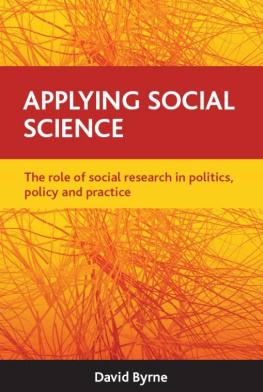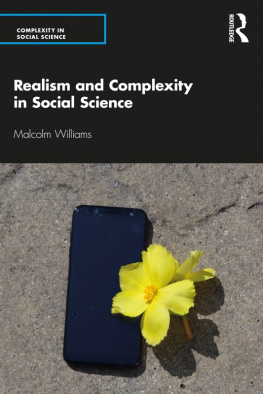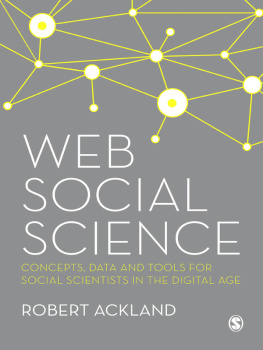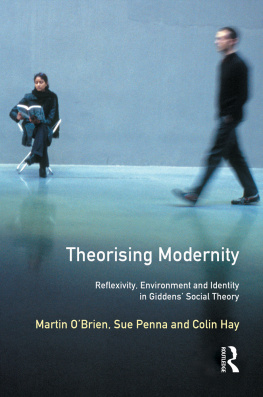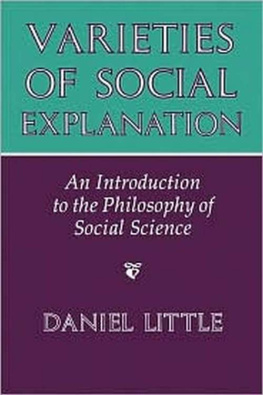First published in Great Britain in 2011 by
Policy Press
University of Bristol
6th Floor
Howard House
Queens Avenue
Clifton
Bristol BS8 1SD
UK
e-mail
www.policypress.co.uk
North American office:
Policy Press
c/o The University of Chicago Press
1427 East 60th Street
Chicago, IL 60637, USA
e:
www.press.uchicago.edu
The Policy Press 2011
British Library Cataloguing in Publication Data
A catalogue record for this book is available from the British Library.
Library of Congress Cataloging-in-Publication Data
A catalog record for this book has been requested.
ISBN 978 1 84742 450 1 paperback
ISBN 978 1 84742 451 8 hardcover
The right of David Byrne to be identified as author of this work has been asserted by him in accordance with the 1988 Copyright, Designs and Patents Act.
All rights reserved: no part of this publication may be reproduced, stored in a retrieval system, or transmitted in any form or by any means, electronic, mechanical, photocopying, recording, or otherwise without the prior permission of The Policy Press.
The statements and opinions contained within this publication are solely those of the author and not of The University of Bristol or The Policy Press. The University of Bristol and The Policy Press disclaim responsibility for any injury to persons or property resulting from any material published in this publication.
The Policy Press works to counter discrimination on grounds of gender, race, disability, age and sexuality.
Cover design by Qube Design Associates, Bristol
Front cover: image kindly supplied by www.alamy.com
Printed and bound in Great Britain by Hobbs, Southampton
The Policy Press uses environmentally responsible print partners
This book is entitled Applying Social Science and that is exactly what it is about. But what does this expression actually mean? A good approach to disentangling the meaning of a phrase is to look carefully at the meaning of the particular words that make it up and then see how they actually work when brought together. Two sources for establishing meaning are the Oxford English Dictionary Online (OED) and Wikipedia . I make no apology for using the latter, despite its own wise warnings to students about the dangers of using tertiary sources in the presentation of work. If what it says makes sense, then use it; this is particularly the case when we have, if not quite triangulated with three points of reference, then at least established another validating cross reference. This works well for the meaning of words and expressions since meaning is established in use the exact principle which informs the definitional practice of the OED and the underlying mode of construction of Wiki definitions through community specification. So below are definitions of the individual words and some of the component elements of the expression applying social science from these two exemplary sources:
Science (from the Latin scientia , meaning knowledge) refers in its broadest sense to any systematic knowledge-base or prescriptive practice that is capable of resulting in a prediction or predictable type of outcome. In this sense, science may refer to a highly skilled technique or practice .
In its more restricted contemporary sense, science refers to a system of acquiring knowledge based on (http://en.wikipedia.org/wiki/Science)
Science, in a more restricted sense: a branch of study which is concerned either with a connected body of demonstrated truths or with observed facts systematically classified and more or less colligated by being brought under general laws, and which includes trustworthy methods for the discovery of new truth within its own domain. In modern use, often treated as synonymous with Natural and Physical Science, and thus restricted to those branches of study that relate to the phenomena of the material universe and their laws, sometimes with implied exclusion of pure mathematics. This is now the dominant sense in ordinary use. (OED Online)
Applied: designating a discipline, or that part of a subject, concerned with the use of specialist or theoretical knowledge in practical or functional contexts, as applied biology, applied chemistry, applied economics, applied kinesiology , etc. Also: designating an expert in or practitioner of such a subject. See also Special uses. Freq. opposed to abstract , pure , or theoretical . (OED Online)
Applied science is the application of knowledge from one or more natural scientific fields to solve practical problems (http://en.wikipedia.org/wiki/Applied_science)
The social sciences are the fields of scientific knowledge and academic scholarship that study social groups and, more generally, human society (http://en.wikipedia.org/wiki/Social_sciences)
Social science: the study of human society and social relationships; a subject within this field, as economics, politics, sociology, etc. (OED Online)

